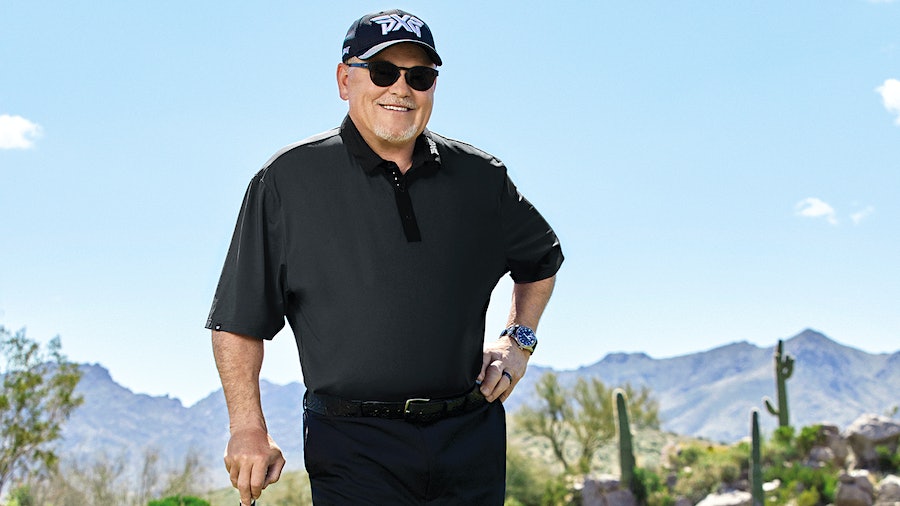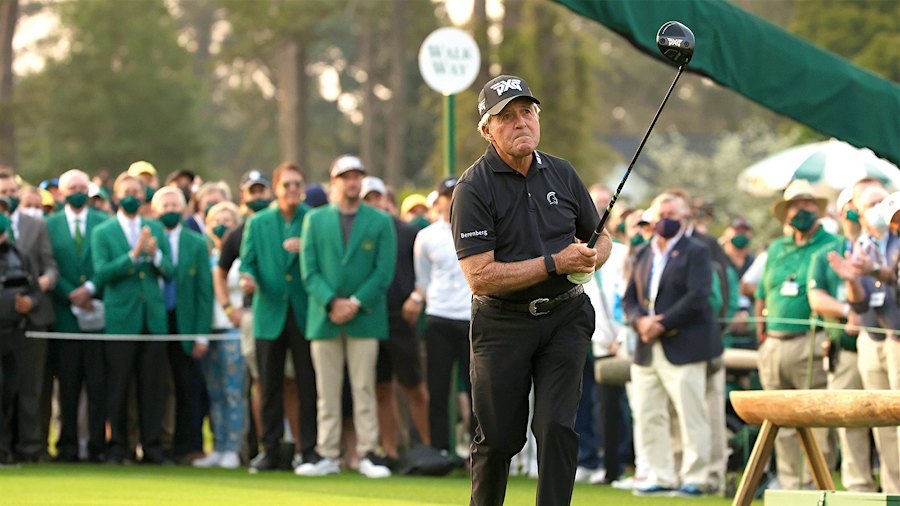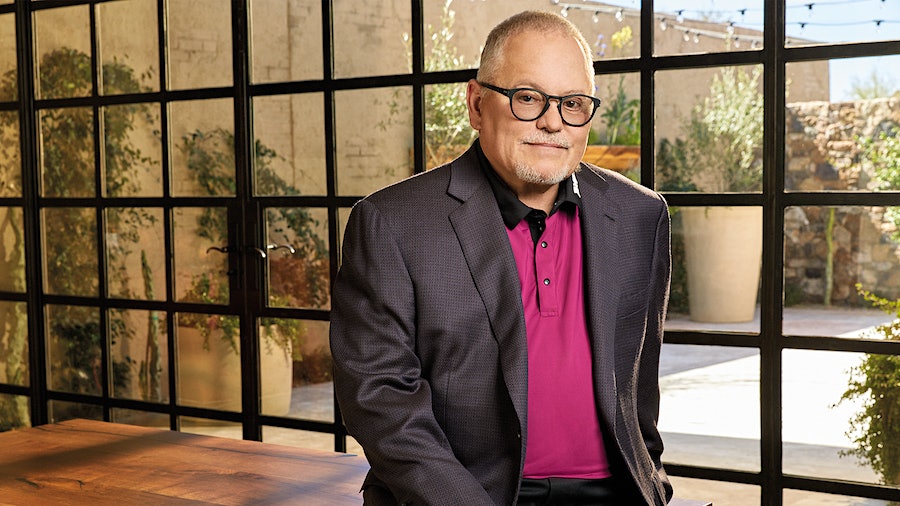The Bob Parsons Project

If you play golf, you know Bob Parsons—even if you don’t know Bob Parsons.
His raspy, gnarly, throaty baritone has dominated golf’s television advertising scene for more than five years, propelling his Parsons Xtreme Golf Co. into the major leagues alongside Callaway, TaylorMade, Ping and Titleist, the giants of the industry. The clubs have a distinctively mean look, devoid of the bright colors found on so many others, with jet-black drivers, putters decorated with a skull and prices that stretch the boundaries of traditional clubs. A full set can go for $5,000 or more.
“Nobody makes golf clubs the way we do, period!” Parsons barks out at the end of these highly successful advertising spots. It’s far more than an advertising pitch. Parsons tells you straight to your face that his company is making the finest clubs on the market, and will tell you in no uncertain terms that is exactly what he was trying to do when he founded PXG in 2013. And it comes as no surprise that Parsons has been successful in the golf club business, given a whirlwind career as a self-taught computer programmer who first founded Parsons Technology, then the GoDaddy Internet domain registrar, and several other companies (shopping malls, real estate, Harley dealerships) all of which led to him becoming fabulously wealthy. Forbes says his net worth is north of $3 billion.
A conversation with Bob Parsons is a rollercoaster ride with a man on a mission, his straight-talking style peppered with “pal,” “brother” and “baby” along with a few choice four-letter words. There’s also the word “golf,” of which he is a bit of a junkie. His is the language of a man who grew up “poor as a church mouse” in Baltimore then found himself on the front lines as a Marine in Vietnam where he was severely wounded by a tripwire explosive. Initially a terrible student, he eventually found his way into the University of Baltimore where he graduated magna cum laude. When he entered the business world, his curiosity and drive led him to unimaginable heights.
Parsons has a large, stocky build matching his oversized personality, with closely cropped hair and an infectious smile. Even as a complete stranger, Parsons takes you into his massive orbit, embraces you with his persona. The 72-year-old lives in the Scottsdale area, one of America’s golf hubs. With a couple billion in his pocket through the majority sale of GoDaddy in 2011, which he founded in 1997 (it was famous for its risqué advertising campaigns), Parsons bought Golf Club Scottsdale in 2013 and renamed it Scottsdale National.
“When I was talking to the members they were so interested in their game they would do whatever they could to improve it, which would include a better set of sticks,” says Parsons. He followed that model of attack, claiming he has spent up to $350,000 in a year on new clubs. “I would always buy whatever new golf clubs came out,” says Parsons. “I had friends who had exotic cars or would go to Las Vegas and gamble. What I would do was buy whatever new golf clubs came out.” But he wasn’t fully satisfied. “Very rarely did they live up to their claims.”
Parsons had a chance meeting and quick nine holes of golf at the Whisper Rock Golf Club with Mike Nicolette, a former PGA Tour player who was chief of design at Ping Golf. Over a couple of years, they had discussions about golf equipment, with Parsons often calling Nicolette at night.
“So I asked Mike, ‘Why don’t these golf clubs get better?’ And he said, ‘The reason they don’t is because we work under a number of constraints,’ ” says Parsons. “ ‘We have to hit certain price points, we have time constraints where we have to release new sticks every so often.’ I said, ‘It seems like if you had enough time and enough money you could do a much better job.’ ”
Some time went by between chats, six months, maybe a year, and a friend told Parsons that Nicolette was ready to change jobs. I said, ‘Mike I’d like to start a golf equipment company and need good engineers like yourself.’ ” It was 2012.
At the time, Nicolette did not know who Parsons really was, other than a fun guy to play a round of golf with, and was not initially interested in leaving Ping. But Parsons had a convincing way about him.
“It was probably another couple of months when I was talking with a friend and he told me that Bob owned GoDaddy. I went ‘Oh!’ That’s when I found out who he was,” Nicolette recalls. “It was probably up to two years of knowing each other when he called me and said, ‘I might have something.’ That was basically the inception of PXG.” Nicolette considered himself strictly a golf club designer and not a manager. He felt that his boss at Ping, Brad Schweigert, might be ideal for Parsons’ startup.
“I said ‘if you are serious, I know your guy. My boss over at Ping, Brad Schweigert. He’s a degreed engineer, he’s been managing a team of about 70 people. He has a masters in business. He has great insight into the industry,’ ” says Nicolette.
Parsons hired both of them, along with some other Ping people, and dove headfirst into the golf club business. The idea was to design the best possible golf clubs, no expenses spared. Parsons started with forgiveness and looks. “I said ‘first, I want an iron that looks like a blade and is more forgiving than a cavity back, feels soft like butter and goes like hell, launches higher, more accurate, has a sweet spot the size of Texas,’ ” says Parsons.
The first tries didn’t quite live up to expectations. “We tried all kinds of things,” says Parsons, “a lot of things that didn’t work. We made a hollow club that, when you hit it, went like hell but felt like shit.” Salvation came via an injection-molded polymer known as elastomer, which helped support the hollowed-out clubs, absorbed the shock of a ball strike and augmented performance. “One day they called me and said, ‘Bob, we’ve had a breakthrough . . . .’ We found this special elastomer and we eventually were able to make the thinnest face in golf and, when we released those first clubs, there was nothing like them.”
The thinner clubhead meant more speed, the elastomer meant better sound. Parsons liked what he was hitting. “Bob is an avid tester,” says Nicolette. “He called me late one night and said, ‘I think we did it. This is the best feeling club I’ve ever hit. Goes farther than anything in my basement.’ ”
PXG’s first clubs were the GEN1 model irons, launched in 2015, which had an eye-popping look and prices to match, around $350 a stick. They were among the most expensive on the market. The clubs had a distinct industrial look with several tungsten screws around the perimeter. Nicolette and Schweigert put them there for testing purposes, to move mass around. They didn’t intend for them to be part of the build, but when Parsons first saw the clubs, he loved the look.
“Bob is integrated into the design of the clubs every step of the way,” says Nicolette. “We made a working prototype that had these little tungsten screws all round the perimeter. We showed the prototype to Bob and he says ‘I love it. That look is so unique.’ ”
From a startup with a handful of staff, PXG is turning out enough clubs that it now has 850 employees. And it has now expanded into both the apparel and golf ball business, recently announcing the PXG Xtreme golf ball, touted as a one-size-fits-all games product. PXG doesn’t deal with big-box retailers, but sells direct through its website and is opening up its own stores. Parsons says his company is profitable.
The clubs are utilized by such professionals as Cameron Tringale and Zach Johnson, and one of the all-time golfing greats, Gary Player, swings PXG Clubs. (Fitting, for Player’s Black Knight nickname and penchant for wearing black works perfectly with the PXG look.) Recent expansions have included some less-expensive versions to appeal to a broader array of golfers.
And true enough to Parsons’ entrepreneurial spirit and bravery, he credits the pandemic for some of his success. “What made the company was Covid,” says Parsons. “When Covid hit, most of our competitors, who are in California, shut down. Ping, which is local, did the same thing. What we did was find a way to work in our build shop in masks. Socially distanced and so forth and we stayed open. Instead of canceling our orders, we doubled down, tripled down. For a while, we were the only golf company that was shipping product.” He calls 2021 “a killer year.”
It would be easy to assume there is a certain amount of bluster around Parsons, who isn’t afraid to speak his mind. But the sincere nature of the man muscles through. He wasn’t born with a silver spoon and his road to wealth and prominence was often rocky and even life threatening.
Growing up in Baltimore, he was a self-confessed poor student. “I flunked fifth grade; who in the hell does that?” he says. By the time he reached his senior year of high school, friends asked him if he wanted to go with them to a Marine Corps recruiter. It was the Vietnam War years. Parsons signed up. Then he went back to his teachers.
“When I went to show my teachers the papers [for the Marine Corps]—and I was failing all my subjects—they all passed me.”
Parsons became a lance corporal on the front lines and was wounded by an explosive device in 1969. He eventually received the Purple Heart medal, Combat Action Ribbon and Vietnam Cross of Gallantry. Despite his injuries, his service in the military was instrumental in organizing his life, giving him structure and discipline.
“The Marine Corps taught me responsibility and determination,” says Parsons. “It showed me how to do a job, even a job you didn’t like, and get it done because that’s what you are supposed to do. And it helped me understand that you could be proud of completing a job. The Marine Corps was enormous in shaping my life.” Parsons pays homage to his service with the numbers on his clubs. Some irons bear the code 0311, Parsons’ military occupational specialty (MOS) number, referring to a rifleman. Drivers might have the number 0811, Marine jargon for artillery. And then there’s the number 26, seen on a skull at the bottom of a PXG putter, referring to Parsons’ regiment in Vietnam.
When Parsons came home from the war, he brought post-traumatic stress disorder with him. While PTSD was a detriment to personal relationships (and ended his first marriage), he found that hard work could relegate it to the background, at least for a while. He entered college on a military service plan, graduated with a degree in accounting and taught himself how to program computers. In 1984, he founded Parsons Technology, where he developed an accounting program called MoneyCounts, which he sold in 1994 to Intuit for $64 million. That windfall was followed by billions from the sale of GoDaddy.
“I might not have done it without PTSD,” he says. “In order to get by and get through it, I buried myself in my work and I worked long, long hours and I loved it. That’s what got me going.”
Parsons was equally determined to overcome the condition, and a few years ago he found a solution in a place he would have never thought of: psychedelic drugs, which he found via Michael Pollan’s book How to Change Your Mind. “I had the world lifted from my shoulders,” he says. “I had the joy back in my life.”
That treatment and its accompanying therapy is part of Parsons’ philanthropic efforts that aid the underserved and ignored. He started the Bob & Renee Parsons Foundation in 2012 to provide grants to nonprofit organizations in various areas, including veterans and military families. Parsons aims to donate about $1 million every 14 days to a legion of causes.
“I got a call from Bob back in 2012,” says Karen Guenther, founder of Semper Fi and the America’s Fund, which aids military veterans. “It was a call out of the blue from Bob saying he was going to give us a million dollars. I thought it was a crank call.” Parsons has donated $83 million to the cause, says Guenther, inspiring twice that in donations from others.
Every year, Parsons does a Marine Corps birthday video on November 10 (the Corps was founded on that day in 1775) that extols the virtues of the military and of helping their cause, especially in the area of mental health and PTSD. It kicks off a matching grant program through the end of the year. Parsons gives the fund $10 million a year through that program.
“You have to look at the man and what he’s accomplished,” says Nicolette. “When you get to that level, don’t you just buy 10 houses around the world and get a yacht and some planes and do your thing as a billionaire? . . . That’s the kind of guy that Bob is. He shares his wealth.”
“I’ve always wanted to help people out,” says Parsons. “I grew up with nothing, very few people helped me in any way. There were a couple of times where I literally had my back against the wall and there was nobody there to help me and I had somebody step up . . . I always remembered the difference that made. I was touched by it. That drives what I do and I have the resources to do it. Of everything I do, that’s the one thing I love the most.”
That, and golf. “I never dreamed I would be in the golf club business,” says Parsons, who has never been afraid to dream.
Jeff Williams is a longtime contributor to Cigar Aficionado.











